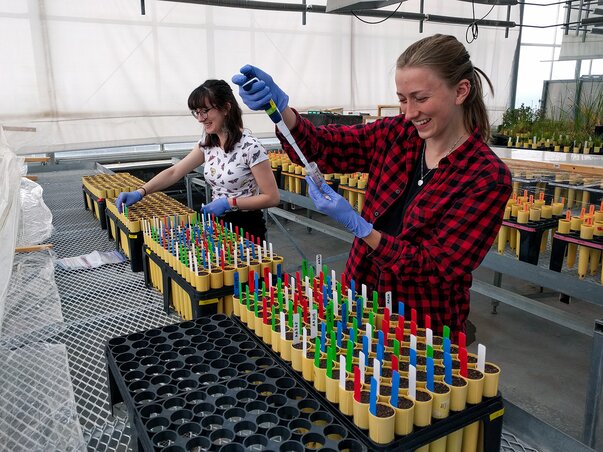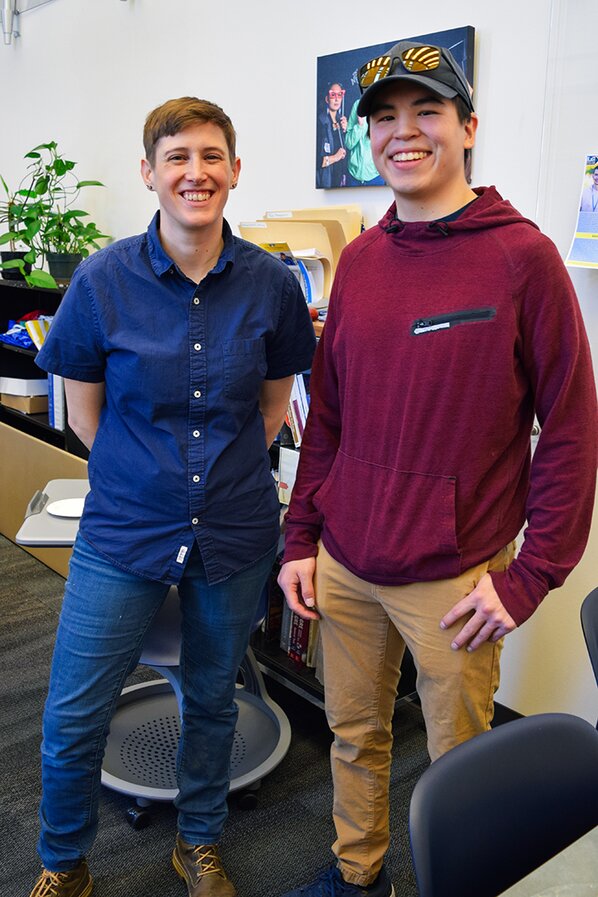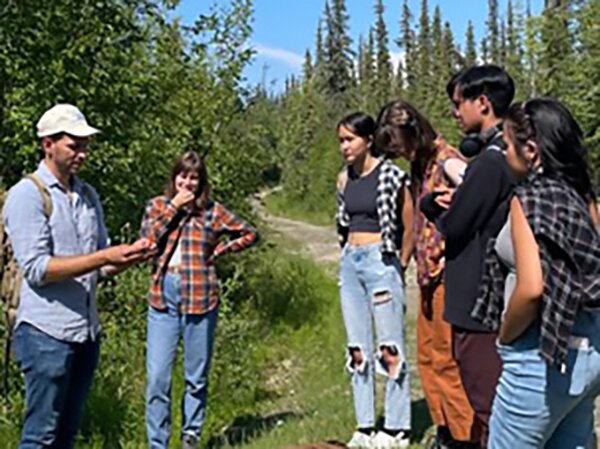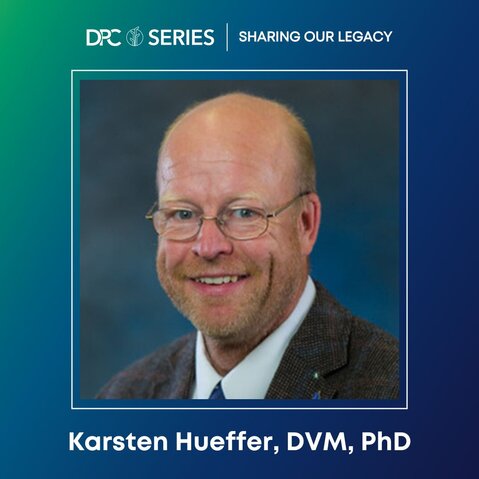A decade of success: UAF BLaST highlights 2014-2024
By Amy Topkok
Over the last 10 years, the Biomedical Learning and Student Training (BLaST) program at University of Alaska Fairbanks (UAF) has offered many research opportunities through innovative approaches to integrate undergraduate research and engage undergraduate students in research at the university level. Funded by the National Institutes of Health, it is one of 10 undergraduate research training BUILD programs across the United States as part of the Diversity Program Consortium.
Though the program is based in Fairbanks, Alaska, UAF BLaST’s partners include all rural and main campuses of UAF and University of Alaska Southeast (UAS), Iḷisaġvik College (Utqiaġvik, AK), Alaska Pacific University (Anchorage, AK), Fort Lewis College (Durango, CO), Salish Kootenai College (Pablo, MT), and Diné College (Tsaile, AZ). BLaST, with its partners, continues to offer educational opportunities with a focus on undergraduate students interested in entering the biomedical workforce.
Alaska is a large state with a small population. There are about 733,391 people living in 583,000 square miles of land and islands, averaging out to about 0.93 square miles for each person in the state. This makes it challenging to offer educational opportunities in higher education, especially for those who come from the 242 villages that range from 15 people to 5,000 people.
The UAF campus started out as a mining college in 1917, making it one of the earliest educational institutions in Alaska. Now it is a hub university where people come from all over the world to learn about many different fields of study.
Attending UAF means coming to the “big city” of Fairbanks of approximately 32,000 people, which can make it difficult for students from smaller villages to adjust to such a large city. To alleviate some of the challenges that come with this transition, BLaST has focused on supporting students through training, mentoring, workshops and a community of scientists.

Devin Drown's former undergraduate mentees Taylor Seitz and BLaST Scholar Jennie Humphrey setting up an experiment in the greenhouse focused on the Fairbanks Permafrost Experimental Site. (June 14, 2018). Photo credit: Devin Drown, UAF.
Multi-Tiered Mentoring
BLaST created a multi-tiered group mentoring system during the first five years of the funding period (2014-2019). They offered Graduate Research and Mentoring Assistantships (GRMAs) to support graduate students who mentored undergraduates on their research projects with a total of 68 GRMA awards. In addition, BLaST funded 54 Faculty Pilot Projects (FPPs) awards, two-year funded research projects, which included projects that focused on salmon genomics, DNA cellular repair, and subsistence health in kelp forest.
In the past ten years, BLaST has supported more than 370 Scholar and URE undergraduate students through research experiences and scholarships, and many more through the FPP awards.
Devin Drown, PhD, an associate professor at the UAF Institute of Arctic and Department of Biology and Wildlife, received FPP awards from 2017-2019, and an award for equipment from 2018-2019. He described the positive impact the program had on him as a researcher and a mentor to students.
“Through BLaST I was able to work with many amazing students and watch them grow into independent researchers,” Drown said. “Alaska BLaST provided me with support and a network of colleagues helping me view my research through the lens of One Health.”
One Health Focus
BLaST research projects included a One Health focus—that human, animal, and environmental health are inextricably linked and the health of each is dependent upon the others. This approach to research resonated with students from rural areas where a subsistence lifestyle is common and links humans closely to the environment through nutrition, economy, lifestyle, and culture.
What followed was the development of the Center for One Health Research at UAF, which focuses on engaging students in One Health research through a One Health master’s (OHM) degree, showcasing the need for research centered in a holistic approach. Several BLaST Scholars have continued their research and entered the OHM program.

Former BLaST RAMP Emily Sousa with current BLaST Scholar Orlin Gologergen at the 2022 BLaST Graduate Celebration held at the BLaST renovated Student Engagement Center at the UAF campus. Photo credit: Amy Topkok
RAMPs
Another one of the program’s unique intervention strategies is the Research Advising and Mentoring Professionals (RAMPs). These individuals offer holistic advising, tutoring, and research support to scholars and other undergraduates.
They offer mentoring opportunities such as monthly mentoring discussion groups to faculty and graduate mentors, as well as undergraduate professional development workshops to discuss and explore a variety of mentor-related topics to increase student engagement.
Training for the RAMPs included cultural and sensitivity-focused workshops, which, after training and skill development, they have been able to offer to other institutions.
RAMPs recognized the need for comprehensive, psychosocial support of students in all aspects of their academic journey. For example, they hosted informal holiday gatherings and celebrations for students, and many RAMPs have maintained contact with scholars after graduation.
Former BLaST RAMP Emily Sousa shared her positive experience while serving in that role.
“Being a RAMP taught me how to be a better mentor and a better advocate for others, and in doing so, for myself too,” Sousa said. “For me, the sign of success is how many students have kept in touch long after they've graduated. It shows we had an impact.”
Many BLaST RAMPs who have left their positions have gone on to pursue graduate, veterinary, and medical degrees.
Faculty Workshops
BLaST not only offered workshops to students, but also supported faculty through over 30 faculty development workshops focusing on cultural/diversity awareness and sensitivity training, and development of mentoring skills.
More than 50 faculty participated in these development opportunities, most of whom work or conduct research in the biomedical fields.
Rural workshops were also offered in Utqiaġvik, Alaska in collaboration with Iḷisaġvik College focused in chemistry, methods in molecular biology, and neurodegeneration. Numerous workshops were also offered annually at Sitka Whalefest, and included hands-on demonstrations such as One Health marine mammal dissections, salmon dissection and sampling methodologies, and also offered a two-credit introduction to research One Health course, taught by BLaST RAMPs. Many of the workshops previously offered by BLaST are now led by community members.
Mario Muscarella, PhD, associate professor of Institute of Arctic and Department of Biology and Wildlife, recipient of a BLaST FPP (2021-2023) and a mentor to many BLaST Scholars and UREs, shared how BLaST benefitted him as a faculty mentor.
“As an early career faculty member, the BLaST program and workshops were incredibly valuable for establishing my research program and beginning to mentor undergraduates in my lab,” Muscarella said. “The workshops provided valuable mentoring skills and support that I continue to use.”
Institutionalizing Responsible Conduct in Research Training
Another institutional contribution is the Responsible Conduct in Research (RCR) training sessions, of which the UAF Office of Research and Integrity (ORI) now offers multiple times per year. Initially, BLaST RAMPs provided RCR training to BLaST students and found there were many other university staff, faculty and other students who also needed the training. These sessions have enhanced student and faculty knowledge and understanding of important topics in conducting ethical research. These trainings also have been utilized by other NIH-funded research programs such as AK-INBRE, r-series grants, NSF applicants, and many others.
BMSC Courses
BLaST RAMPs also teach the biomedical science courses, including Introduction to Research, Entering Research, BLaST Research Skills Seminar I and BLaST Research Skills Seminar II, which are offered annually to all undergraduate students. These courses aim to open the door for students to pursue biomedical research and One Health training opportunities. They integrate current research practices while enabling students to see themselves as scientists and researchers.

Muscarella (left in cap), teaching at the 2022 RAHI Research program, Fairbanks, Alaska. Photo Credit: L. Gildehaus.
Travel Awards
BLaST also provided many travel awards for UAF and partner faculty, staff, and students, enabling them to gain experience in presenting their research and making connections with others in their field. These conferences and workshops provided information on careers in One Health fields, new findings in research, and opportunities to network with professionals.
Conferences in Alaska included the Western Alaska Interdisciplinary Sciences Conference (WAISC), the creation and support of the One Health, One Future Conference, and nationally, Experimental Biology, Society for the Advancement of Chicanos and Native American students (SACNAS), and Annual Biomedical Research Conference for Minoritized Scientists (ABRCMS).
Infrastructure and Equipment
Many BLaST renovations and equipment awards were awarded in the first five years and completed by 2018. BLaST renovated space on the UAF campus to create the Student Engagement Center, a space that houses the BLaST RAMPs and provides a space for students to study and gather. This space is also used for informal gatherings and BLaST celebrations, events that often build a sense of community for students that come from rural villages or smaller towns.
Other improvements included the creation of new laboratories (Iḷisaġvik biology lab, Sitka Sound Science Center lab), and renovations of existing laboratories (Northwest Campus-Nome, Kuskokwim Campus-Bethel). Often the faculty who submitted the renovation applications also became Faculty Pilot Project awardees, showcasing the need for rural centers and campuses to upgrade and have equipment to match other areas of the nation.
Reflecting on UAF BLaST’s legacy
BLaST principal investigator Karsten Hueffer, DVM, PhD, reflected on the impact and legacy of the program as part of a DPC interview series called “Sharing our legacy: Reflections from consortium leaders.”
Hueffer said BLaST was able to build a supportive community that supported students as human beings, looking beyond their GPA, to find what students need to be successful in life. He hopes that this holistic view of students lives on at UAF beyond the program’s tenure.
“I hope that we can move a little bit towards a broadening of the definition of success at the national level so that it is not just how many students go into a PhD program in biomedical sciences and become an R01 funded independent biomedical researcher,” Hueffer said. “Most of our students are first-generation coming from these small villages [and] educational opportunities are just not the same [so] if we get students from these communities to graduate and [then] do meaningful work in these communities . . . that is a success, even if it's not a measurable success in some data reporting table.”
To watch Hueffer’s entire interview on BLaST’s legacy, visit his story page.

Karsten Hueffer, DVM, PhD
The Coordination and Evaluation Center at UCLA is supported under award number U54GM119024.

Grow Together.
